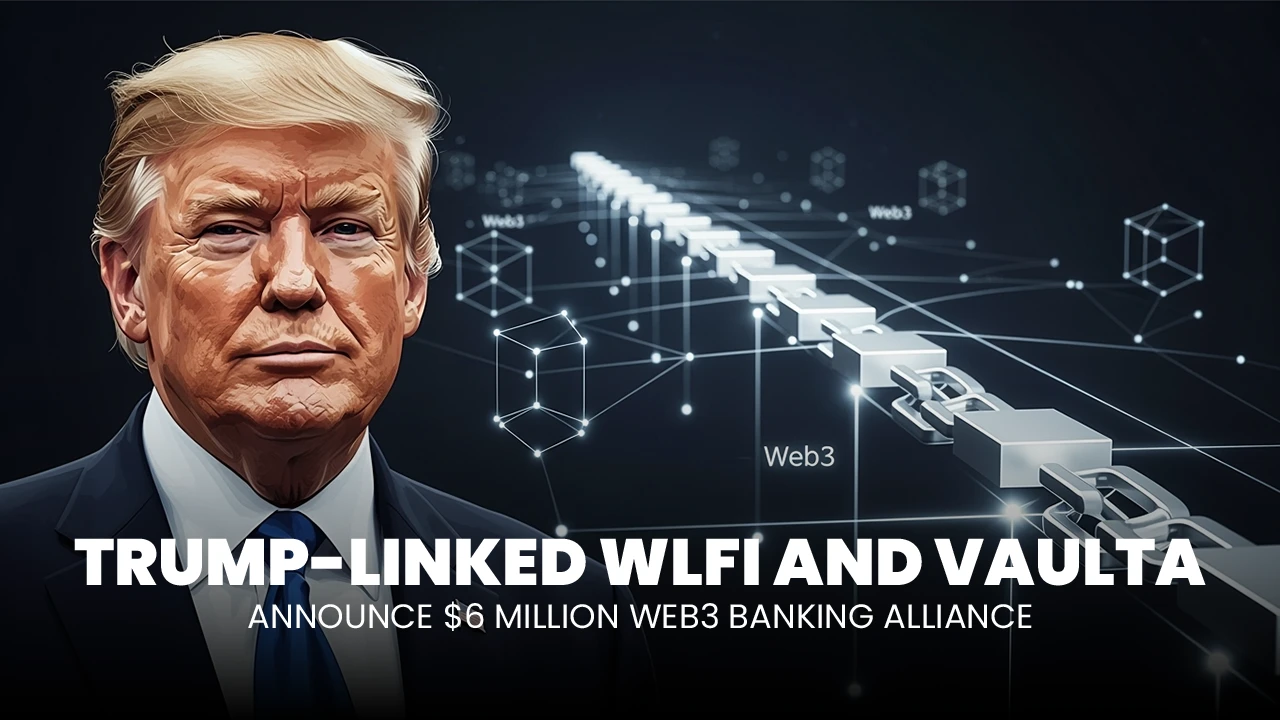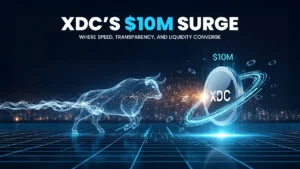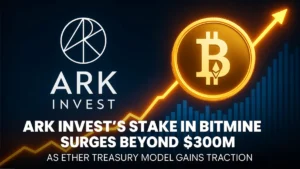Trump-Linked WLFI, Vaulta Announce Promising $6M Web3 Banking Alliance

World Liberty Forum International (WLFI), a project backed by Donald Trump allies, has entered into a landmark $6 million agreement with Vaulta, formerly known as EOS Network Foundation. This partnership aims to build a fully regulatory-compliant Web3 banking and payment platform, bringing blockchain closer to mainstream financial systems.
Vaulta, renowned for its blockchain expertise, will power the initiative through its cutting-edge infrastructure, which utilizes the Delegated Proof of Stake consensus mechanism. This system enables high performance and scalability, making it ideal for real-world financial applications that demand speed, security, and efficiency.
$6 Million Vote of Confidence in Vaulta’s Blockchain
Under the agreement, WLFI will purchase $6 million worth of Vaulta’s native VLT tokens. These tokens will be deployed to support the technical and economic backbone of the new banking solution. The decision to invest in Vaulta underscores WLFI’s commitment to building its platform on a proven and efficient blockchain protocol.
Vaulta’s blockchain operates on Delegated Proof of Stake, a protocol that allows for faster transaction speeds and lower energy consumption. By selecting a DPoS-based network, WLFI ensures that the infrastructure can support enterprise-grade financial activities without sacrificing decentralization or reliability.
Regulatory Compliance at the Core
One of the key objectives of the partnership is to deliver a Web3 banking platform that aligns with global regulatory requirements. With increasing scrutiny on digital assets from financial watchdogs around the world, WLFI and Vaulta are positioning their alliance as a secure and transparent alternative to traditional banking systems.
The partnership will focus on integrating identity verification, anti-money laundering protocols, and other compliance frameworks directly into the blockchain architecture. This level of oversight, combined with the scalability offered by Delegated Proof of Stake, is expected to attract institutional interest and broaden public adoption.
Supercharged by Tokens: Fueling a Scalable Financial Ecosystem
WLFI’s token ecosystem is designed to support a broad range of financial activities, including payments, cross-border transfers, and tokenized banking services. The $6 million VLT token purchase will fund development of core infrastructure and ecosystem incentives, ensuring sustained growth.
ALSO READ: TRON Eclipses Bitcoin on Performance Metrics as Altseason Heats Up
By integrating Vaulta’s Delegated Proof of Stake system, WLFI can maintain network integrity while processing thousands of transactions per second. This performance is critical for a banking application that aims to compete with traditional fintech platforms.
Vaulta’s Rebranding and New Vision
Vaulta, which previously operated as EOS Network Foundation, rebranded as part of its mission to serve institutional blockchain needs in mid-March 2025, with the announcement coming on March 18, 2025. The rebrand includes a 1:1 token swap starting May 14, 2025, with the full transition, including the new token ticker and the establishment of an advisory council. The platform remains anchored in the robust architecture of EOSIO but has expanded its offerings to deliver secure, compliant, and high-speed blockchain infrastructure.
Vaulta’s leadership views the partnership with WLFI as a pivotal moment in the institutional adoption of blockchain technology. Its DPoS protocol has proven its ability to support real-time, high-volume data processing, making it a strong fit for financial platforms like the one WLFI envisions.
Conclusion
The $6 million alliance between WLFI and Vaulta represents more than just a business deal. It marks a shift toward regulatory-compliant, scalable, and high-performance Web3 banking. Powered by the Delegated Proof of Stake protocol, this collaboration could establish a new standard for integrating blockchain into global finance.
Both parties are aligning their strengths, with WLFI’s influence and market reach, and Vaulta’s technical infrastructure, to deliver a solution that could reshape the digital banking experience. With Delegated Proof of Stake as the core engine, the partnership has the technological foundation needed to fulfill its ambitious goals.
Frequently Asked Questions (FAQs)
What is WLFI?
WLFI (World Liberty Forum International) is a digital financial initiative supported by allies of former U.S. President Donald Trump, focused on building decentralized financial infrastructure.
What is Vaulta?
Vaulta is the rebranded name for the EOS Network Foundation, a blockchain technology provider recognized for its scalable infrastructure built on the DPoS consensus mechanism.
What is Delegated Proof of Stake?
Delegated Proof of Stake is a consensus mechanism used by some blockchains to validate transactions efficiently. It delegates responsibility to a selected group of nodes, increasing transaction speed and scalability.
Why is regulatory compliance important?
As governments increase oversight of digital assets, compliance ensures that Web3 platforms can operate legally and gain the trust of users and institutions.
What are VLT tokens?
VLT is Vaulta’s native token used to support network operations, staking, and governance on its Delegated Proof of Stake blockchain.
Glossary of Key Terms
WLFI: World Liberty Forum International, a Web3 financial initiative
Vaulta: Blockchain platform formerly known as EOS Network Foundation
VLT Token: Native cryptocurrency of the Vaulta network
Delegated Proof of Stake (DPoS): A blockchain consensus protocol designed for high performance
Web3 Banking: Decentralized banking services enabled by blockchain
Regulatory Compliance: Adherence to laws and standards governing financial services
EOSIO: Blockchain software upon which Vaulta is built
Token Purchase: Acquisition of digital tokens for economic participation in a network
Blockchain Infrastructure: A technical framework supporting blockchain-based applications
Scalability: The ability of a system to handle growing amounts of work or demand.




